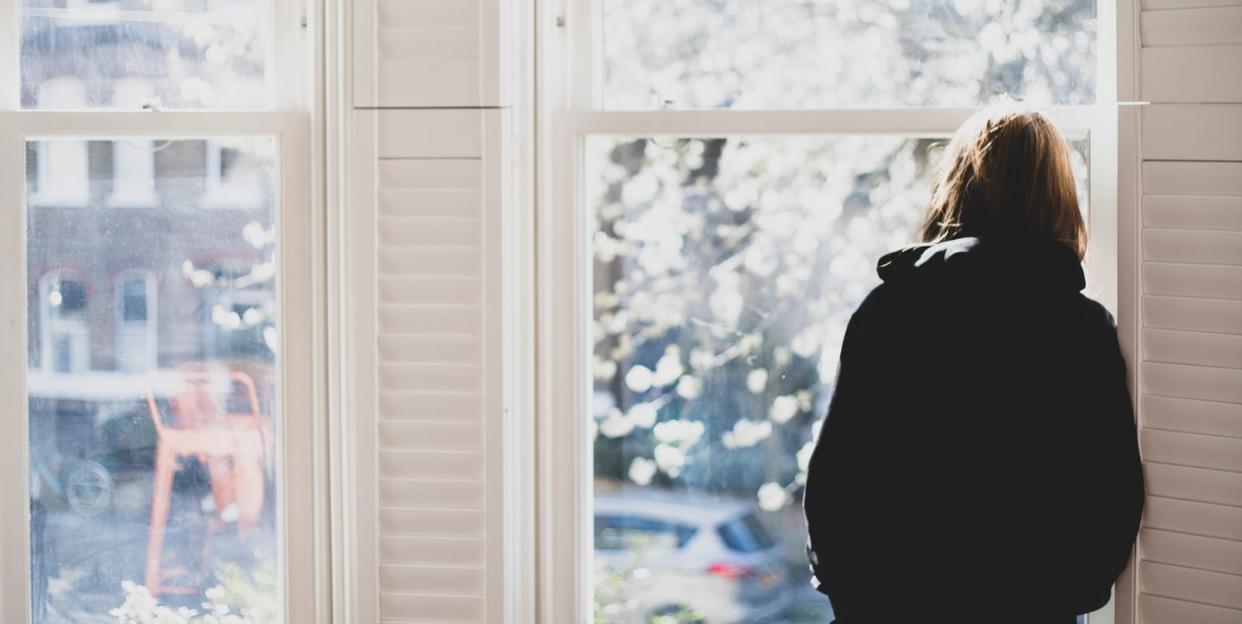7 physical symptoms of loneliness you may not be aware of

While loneliness is a transient feeling that many of us will experience at some point in our lives, longstanding loneliness can severely affect both our mental and physical health.
"Loneliness and isolation were a huge problem prior to COVID-19 with enormous consequences on the emotional wellbeing of the individuals affected," Ashley Liston, a retired GP and trustee at Linking Lives UK, tells Country Living. "Over the past months, the problem has been exacerbated by lockdown with restricted social contact adversely affecting mainly the elderly but also many young people too."
Feelings of chronic loneliness can be triggered by:
Living alone for the first time
A break-up or divorce
Working from home
Moving to a new city
Changing jobs or school
7 physical symptoms caused by loneliness
1. Social anxiety
If you are regularly feeling lonely, a key indicator might be that social events leave you feeling burned out, emotionally drained or mentally exhausted.
"In terms of mental health, lonely individuals are more prone to depression and anxiety, particularly social anxiety. It also puts individuals at greater risk of cognitive decline and dementia," Dr Kalpa Kharicha, Head of Innovation, Policy and Research at Campaign to End Loneliness, tells us.
2. High blood pressure
"There is strong evidence that loneliness can also have an adverse effect on physical health too. This is probably a consequence of the stress that is experienced through loneliness which results in higher levels of natural steroids," Ashley tells CL.
"This can cause high blood pressure and elevated levels of cholesterol which results in higher levels of cardiovascular disease. It has been estimated that living with loneliness is equivalent to the effect of smoking a packet of cigarettes each day and that it puts people at a 50% increased risk of death."
3. Difficulty sleeping
Insomnia, disrupted sleep or other sleep-related issues may all be physical symptoms of loneliness. Another sign is sleeping too much; often when people are feeling sad, or in this case lonely, many turn to sleep as a way to block out how they feel.
According to previous research published in the journal Sleep, loneliness can wreck the chances of getting a restful night's sleep. "What we found was that loneliness does not appear to change the total amount of sleep in individuals, but awakens them more times during the night," lead author Lianne Kurina, PhD, said. "When you feel lonely, you show more micro-awakenings."

4. Loss of confidence
"Loneliness is an emotional response to an unwanted situation. Over time, loneliness can affect confidence and self-esteem and make people withdraw from others – and end up avoiding situations that may help reduce feelings of loneliness," Dr Kalpa adds.
5. Loss of appetite and exercising
Some signs of loneliness also include a loss of appetite and not finding the motivation to exercise. Dr Kalpa tells us: "Lifestyle related, i.e. people may take less care over eating well/healthily, may not exercise as much as they should, more likely to smoke and we know these have a negative effect on our health."

6. Feeling in a constant "unpleasant" state
While many of us will suffer bouts of sadness, those with chronic loneliness will feel like they are constantly in an "unpleasant" state, unable to find any hope.
"If we think about loneliness as this adaptive response kind of like hunger and thirst, it's this unpleasant state that motivates us to seek out social connections just like hunger motivates us to seek out food," Julianne Holt-Lunstad, a professor of psychology and neuroscience at Brigham Young University told Business Insider.
7. Increased desire to binge-watch
Previous research conducted by the University of Texas found that the more lonely a person is, the more likely they are to binge-watch TV or films. While this is something many of us do occasionally, the study found that, sadly, lonely people do this as a distraction.
What to do if you are feeling lonely
"If you have been feeling lonely for a while, a first step is to notice and identify this, even just to yourself. Everyone will have a different experience of loneliness and different reasons for why they are feeling this way," Dr Kalpa Kharicha says.
"Don't keep it to yourself. It's tempting to think that loneliness is something you should keep to yourself but opening up about how you feel might really help as you may find that other people have had similar experiences. Talking to someone about your feelings of loneliness and learning positive coping techniques can be a helpful way to deal with the negative emotions associated with loneliness."
If you feel lonely or don't have anyone to talk to, there are plenty of helplines that exist to offer support. These include:
The Silver Line is a confidential, free helpline for older people across the UK.
Age UK offers help to the elderly who need advice, support and help.
The Mix offers support for those aged under 25. Experts are on hand to help with mental health issues, money worries, and tips on how to cope with loneliness.
The Samaritans runs a 24/7 helpline for anyone who wants someone to listen.
Runaway Helpline provides expert advice for the young that need support.
Visit your local GP for further advice if you need additional support.
For more advice on overcoming loneliness in the countryside, visit our advice pages.
Like this article? Sign up to our newsletter to get more articles like this delivered straight to your inbox.
You Might Also Like


